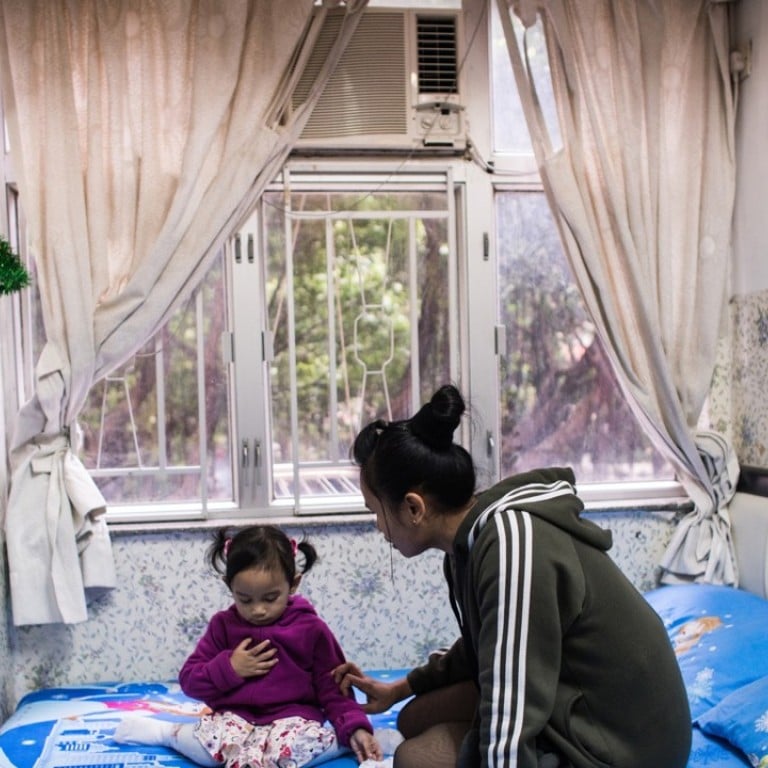
Fighting for the right to stay: for children born in Hong Kong to domestic workers, it’s an uphill battle to get permanent residency
Courts do not agree that maids and their children should get to remain in city for good. But some NGOs and human rights activists say these rulings fail to protect society’s most vulnerable members
Filipino domestic workers Antonio* and Marilou met in Hong Kong, fell in love and got married four years ago. He is 45 and has been here for 30 years, working as a domestic helper throughout, and she is 33 and a maid for more than a decade.
When their daughter Gracia was born last year, the couple was overjoyed, even though the new family was forced to live apart. To comply with Hong Kong rules, Gracia stays with Marilou in her employer’s flat in a private estate, while Antonio lives with his employer and visits his wife and daughter only three or four times a week.
Hong Kong allows foreign domestic workers to marry and have children, and the mothers are entitled to 10 weeks’ paid maternity leave like the city’s other working women. The children can stay, attend public schools and use community services, provided they live with their parents throughout.
Antonio and Marilou count themselves fortunate because both their employers allow Gracia to be with them. But they know they are living an abnormal life, married but separated.
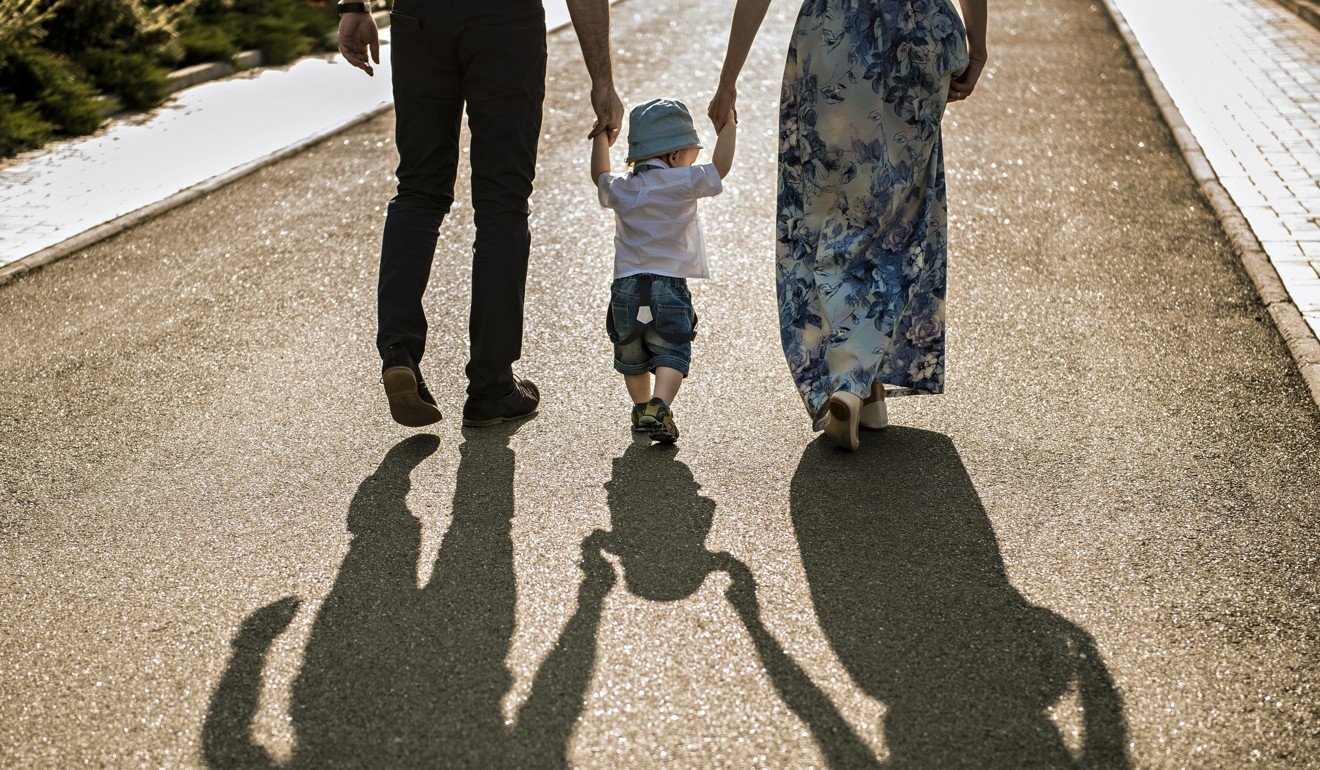
“She is mommy’s girl,” Antonio said. “I am her playmate. I always make her laugh. When I need to go, she just smiles. And she will be sad after I leave. My wife tells me she keeps saying ‘tatay’ – ‘father’ in Tagalog.”
After all these years in Hong Kong, Antonio and Marilou would like to remain and make this their child’s home. But important rulings by the apex Court of Final Appeal (CFA) in 2013 and 2014 deemed foreign domestic workers ineligible for permanent residency, and cast doubt over whether their children are entitled to the status.
“It’s like Hong Kong allows us to stay here, but only under such circumstances that we will never have the ability to live normally,” Antonio said. “It’s quite cruel. We’re welcome here by the Hong Kong government only because the city needs us.”
Fighting to protect the “vulnerable”
Filipinos make up 54 per cent of helpers, followed by Indonesians at 43 per cent. About 99 per cent of them are women.
No official statistics are available for the number of maids who have married, had children here, or how many have been granted permanent residency.
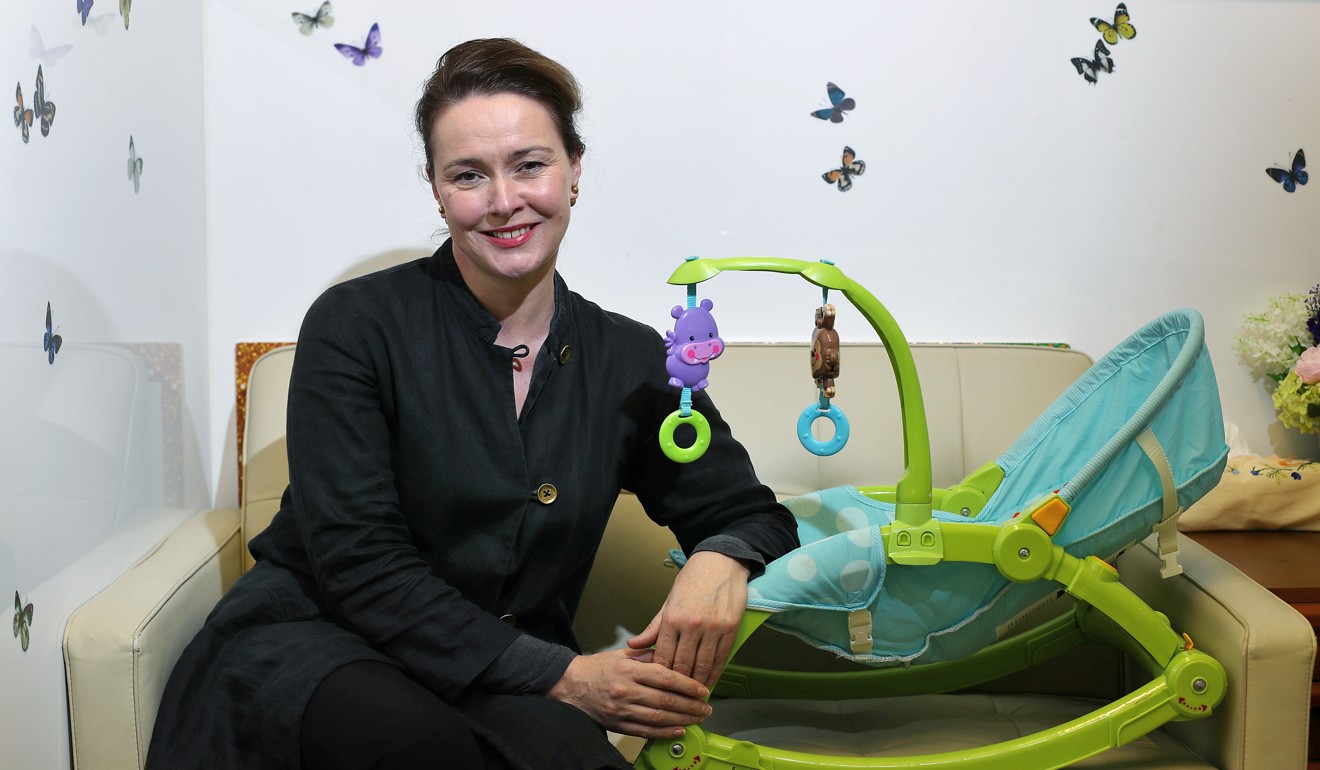
But Pathfinders, an NGO founded in 2008 to help the children of domestic workers, has worked with about 5,500 families over the past decade, indicating that the number of children runs into the thousands.
With the maid population projected to rise, Pathfinders expects its “burgeoning” caseload to expand even more.
Its chief executive, Kay McArdle, said when a foreign domestic worker gets pregnant, there are no government guidelines on how best to safeguard the interests of the worker, her employer or her baby.
Video links to hear foreign worker disputes ‘must be reconsidered’
“I would even go so far as to say that these are probably the most vulnerable children in Hong Kong.”
Firing a maid during her pregnancy is illegal, and employers caught doing so face a fine of HK$100,000 (US$12,700), but groups that help foreign workers say this is a common practice.
These are probably the most vulnerable children in Hong Kong
Complicating the matter is that maids must live with their employers. If a maid’s contract is terminated, she must leave Hong Kong within 14 days.
Concern groups said maids rarely tell their employers they are pregnant, fearing they would be sacked and have to leave the city. When the employers eventually find out and sack them, the maids are often too heavily pregnant to leave as most airlines do not allow them to fly.
McArdle said: “The maid is suddenly homeless because of the live-in rule. She is fired, she’s on the street, she has nowhere to live, and she is truly poor. The consequence is that the woman and child are then left as the victims who are criminalised as immigration overstayers. You can see that this cycle is wrong.”
According to the Labour Department, from January 2015 to June this year, only one employer has been prosecuted for terminating the contract of a pregnant helper.
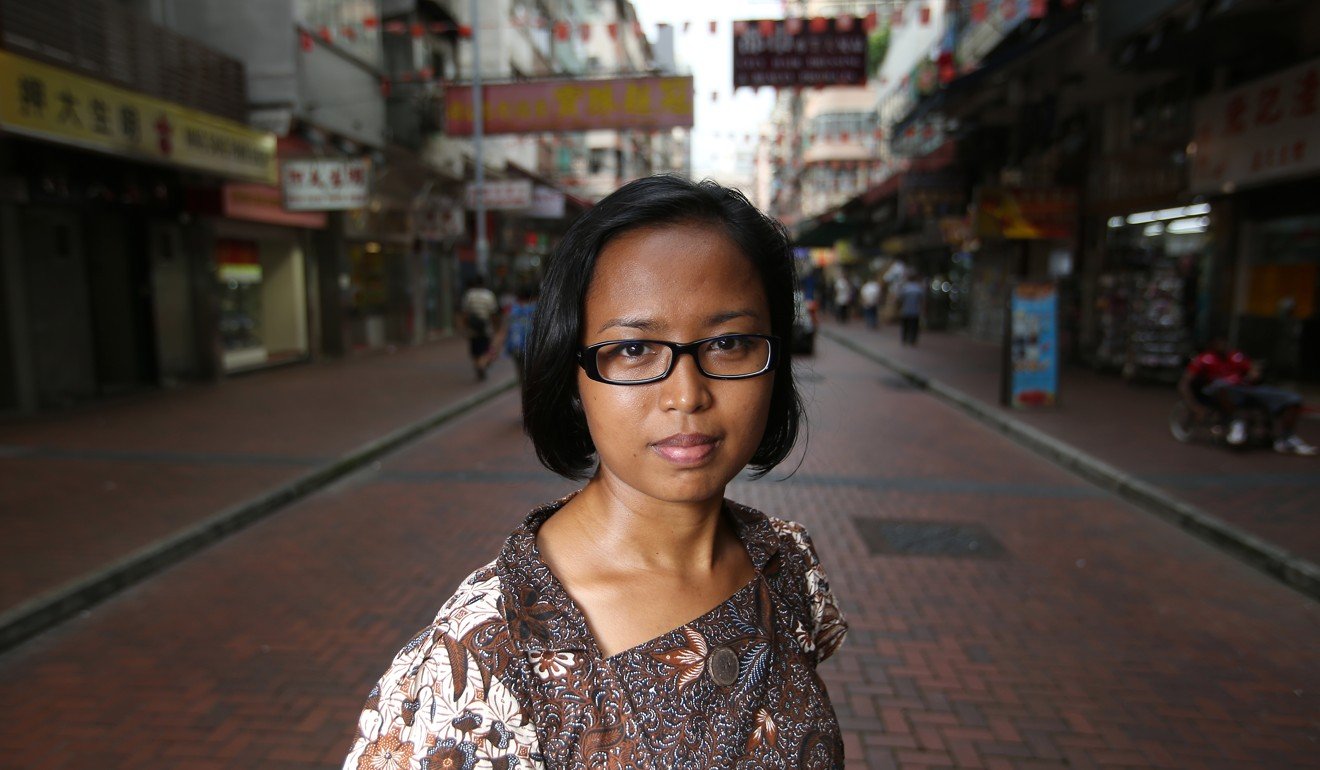
McArdle proposed that domestic workers be allowed to live away from the employers during their maternity leave. They should also have the option to take unpaid leave to return home and give birth there, before becoming too pregnant to fly, she added.
Eni Lestari, an Indonesian domestic worker and spokeswoman of the Asian Migrants’ Coordinating Body, said both maids and their children should be eligible for permanent residency.
“Some domestic workers are afraid of getting pregnant in Hong Kong,” she said. “But how can the government expect the workers to be here for so many years and not have children?”
No room for maid and baby
The NGOs may want more done to protect foreign domestic workers and their children, but not everyone feels the same. Some contend it is impractical to expect employers to provide accommodation to maids and their children in Hong Kong’s notoriously small homes.
Indeed, maid welfare groups themselves have been calling for better accommodation for helpers, as many have to sleep in the kitchen, store room, and even toilet of their employers’ homes.
Do taxpayers in Hong Kong want more people to share the limited social welfare resources?
“It’s impossible for the workers and their children to live together with the employers,” she said. “The flats are so small in Hong Kong. And if the workers have to take care of their children, can they still do their jobs and take care of the employer’s family members?”
Liu said she had yet to hear of any employers allowing their maids to raise their children at the employers’ homes.
“Some domestic workers want to give birth in Hong Kong because they are entitled to maternity leave. That’s why they don’t want return to their home countries,” she added.
Liu and Betty Yung Ma Shan-yee, chairwoman of the Employers of Domestic Helpers Association, do not agree that the children of helpers should be granted permanent residency no matter how long they have lived in Hong Kong.
They fear that if the authorities ease up, more helpers would have babies and try to remain permanently.
“Do taxpayers in Hong Kong want more people to share the limited social welfare resources?” Yung asked.
Going to court to win the right of permanent residency
An important decision by the top court in 2013 made clear that foreign domestic workers have no right to permanent residency. And another ruling by the CFA in 2014 made it uncertain whether their children are eligible.
In 2013, the CFA affirmed the government’s right to impose immigration control in deciding that maids are not eligible for permanent residency.
The landmark judgment ended a two-year right-of-abode quest by Filipino domestic helpers Evangeline Vallejos and Daniel Domingo, who had worked in Hong Kong for more than 20 years and sought a judicial review of immigration law.
Foreign domestic workers did not qualify because, the court reasoned, their residence is “highly restricted”, as permission for them to enter Hong Kong is tied solely to employment, and helpers work for specific employers.
Then, in 2014, the top court ruled in another case that a Filipino maid’s 17-year-old son who was born and raised in Hong Kong was not entitled to permanent residency. The court dismissed the teenager’s challenge to an Immigration Department decision.
Shelter for helpers wins reprieve from closure threat – for now
Even though Joseph Gutierrez had lived in the city all his life, the court decided there was no evidence that any arrangements had been made by himself or on his behalf to establish Hong Kong as his place of permanent residency.
Its decision turned on the issue of what would happen to the teenager if his mother lost her job and had to leave Hong Kong. Gutierrez’s mother, Josephine Gutierrez, had been in the city since 1991 and was no longer in contact with the boy’s father, a United States citizen.
Human rights lawyer Mark Daly, who represented the families in both cases, said it became more difficult for children to obtain permanent residency after the 2013 decision, and even more so after the 2014 ruling.
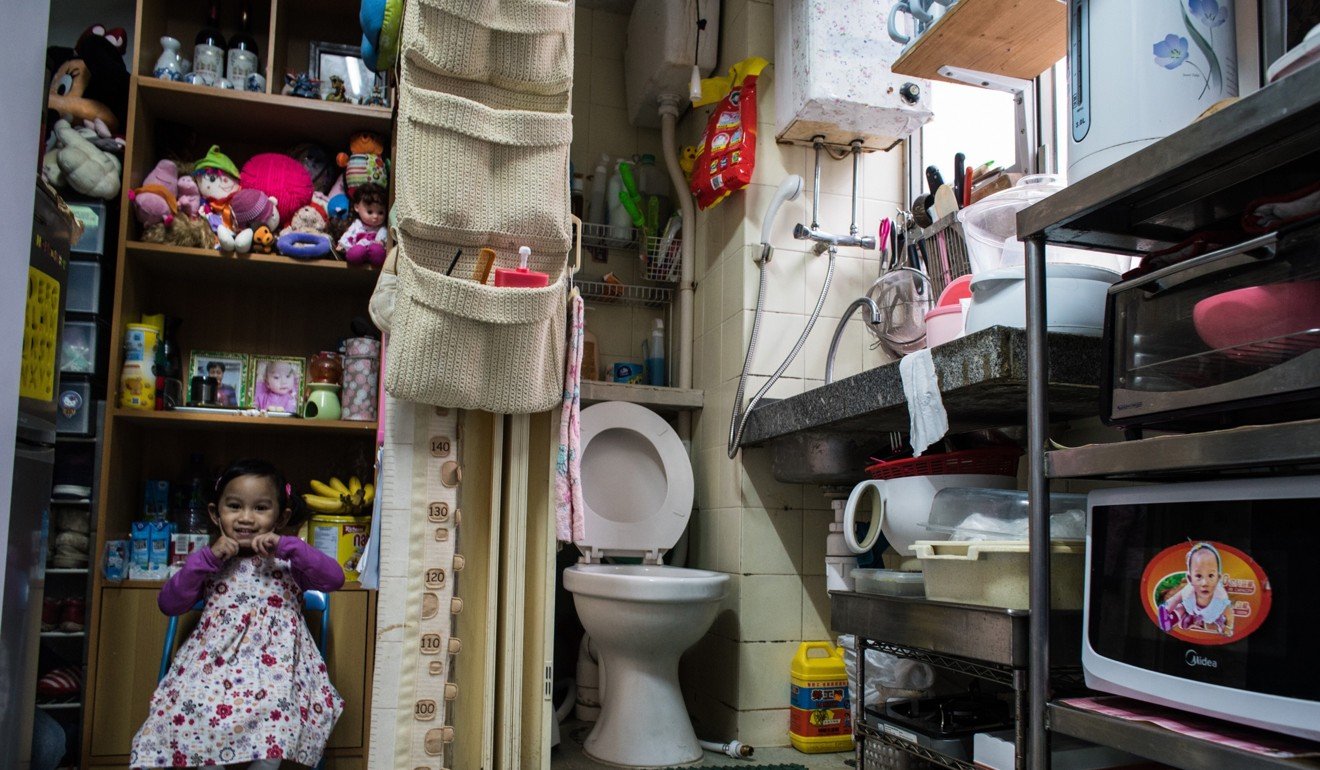
He said Hong Kong’s policies relating to foreign domestic workers and their children “foster a racist, nationalistic view instead of a more inclusive, family-friendly and pluralistic view”.
“If the convention is not fully implemented, Hong Kong risks paying lip services to children’s rights,” he said.
Tour with a difference – learn about life of helpers on their day off
Another lawyer pointed out, however, that the immigration rules for children of foreign domestic workers were no different than for children of other foreigners.
Barrister Peter Barnes, who has worked on migrants’ cases, said children born in Hong Kong are entitled to permanent residency at birth only if either parent is already a permanent resident.
Since helpers can never accrue the necessary seven years of “ordinary residence”, their children are not entitled to permanent residency just because they were born in Hong Kong, Barnes explained.
“This is no different to other non-Chinese children born to foreign nationals in Hong Kong. It is just that if one of the parents has acquired permanent residency status at the time of their birth, then and only then will the children be permanent residents at birth.”
Success for a few who persist
Despite the court rulings, Pathfinders has persisted in helping children of domestic workers in their pursuit of permanent residency.
Between March 2016 and June this year, it took up the cases of nine children. Two applications succeeded, four were rejected, one is pending and two have not been filed yet.
Celine Dermine, a programme manager for the NGO, said the most difficult criterion to fulfil is to prove that the applicant has taken Hong Kong as his or her permanent residence.
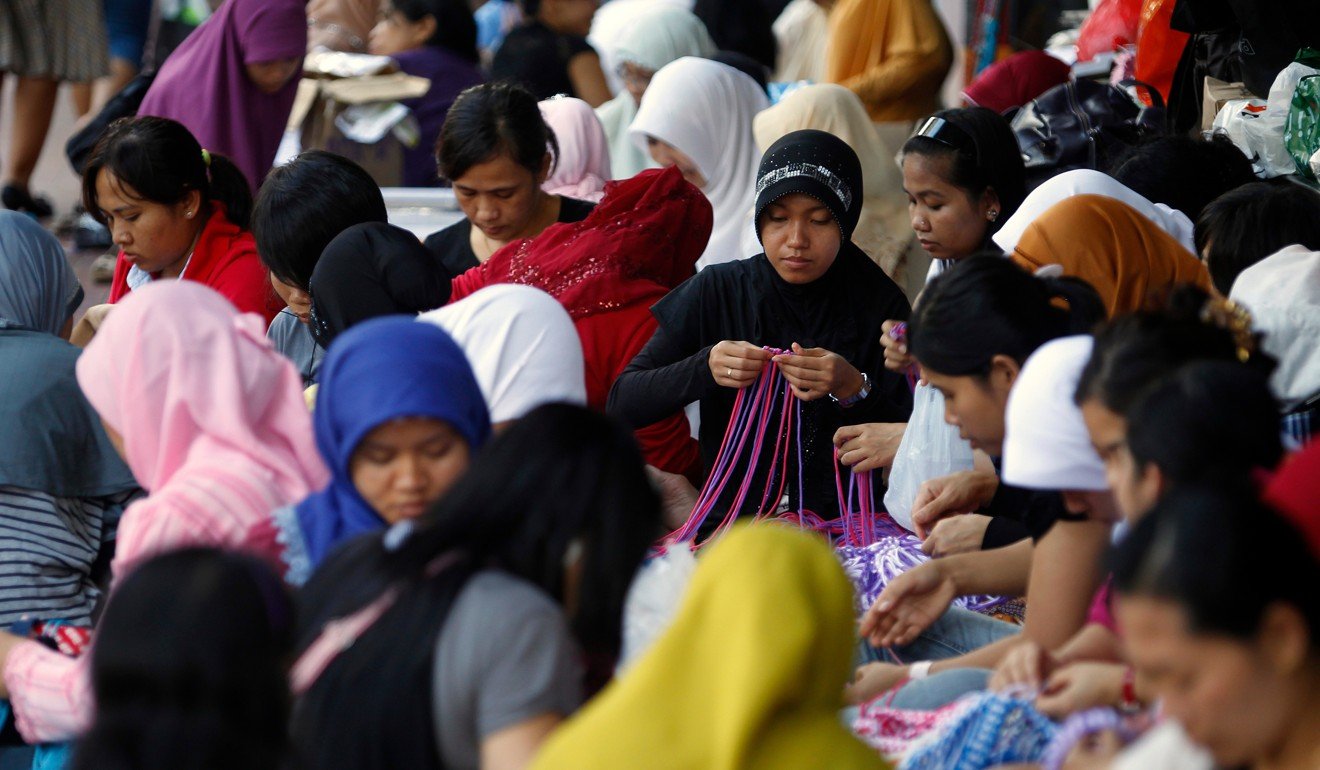
She said the immigration authorities always ask what will happen to a child if his or her parents lose their jobs and must leave Hong Kong. How will the child remain behind?
From her experience, children stand a higher chance of securing permanent residency if their parents’ employers, or anyone else willing to do so, will promise in writing to support the children, such as taking care of the children’s welfare, if the parents are out of work.
Indian domestic worker Shreya remembers 2013 as a special year: that was when her daughter Divya and son Sachin, now 16 and 10 respectively, obtained permanent residency.
Make Hong Kong more accessible to skilled Filipinos, envoy urges
“I was so happy I cried,” recalled Shreya, 43, who has worked in the city for more than 20 years. “I don’t want to take my children back to India. I have lived in Hong Kong for half of my life. My children were also born here, so let them stay.”
Because of the live-in rules, Shreya lives separately from her husband, Anand. She keeps Sachin with her, while Divya lives with her father. Both the parents’ employers are Indian too.
“My son and daughter always want to play together, but they just can’t. And I can only see my husband when I am off,” Shreya said.
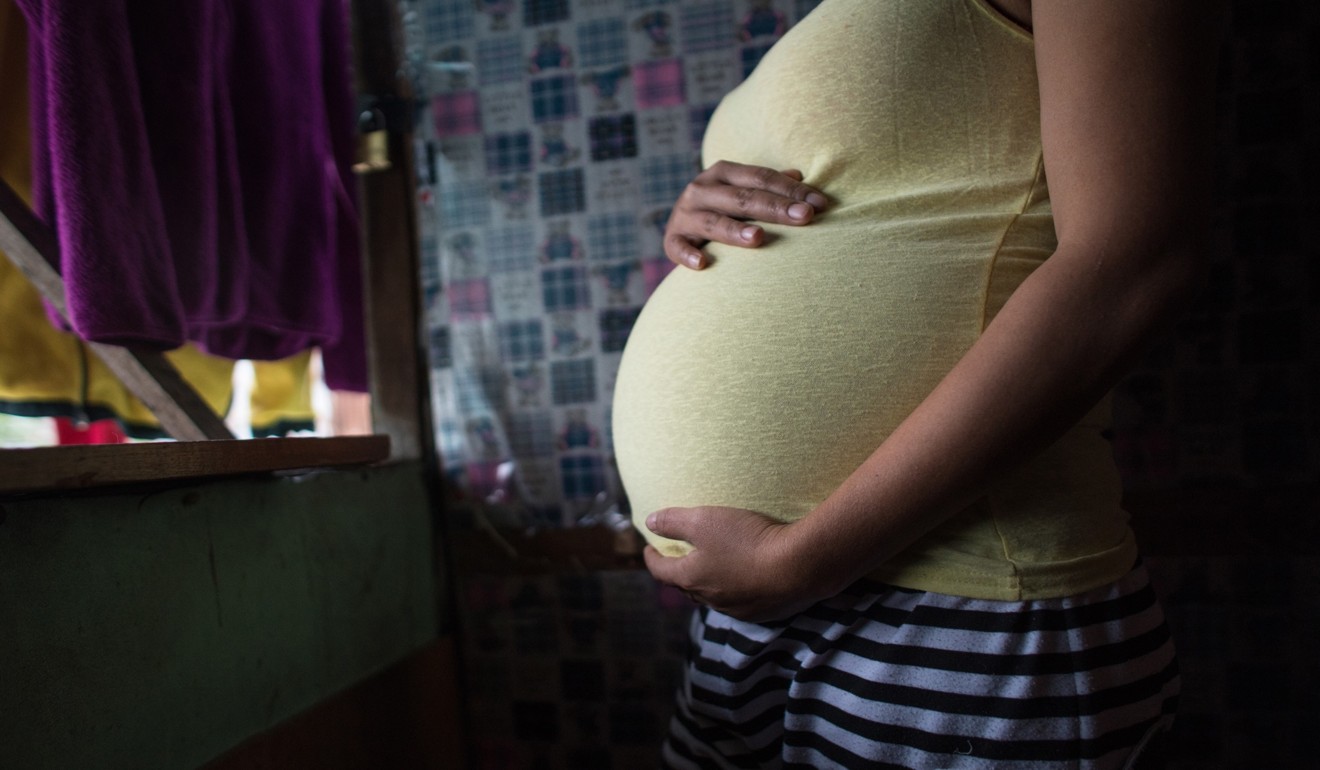
Concern groups said the rare employers who allow their helpers to raise their children in their homes are usually from the same country as their workers.
Still, obtaining permanent residency for Divya and Sachin was not easy. Divya was 11 when Shreya tried the first time and was rejected straight away.
“[The immigration officers] said I was a domestic worker, and my children were to follow my visa,” the mother recalled. “The department said it did not give permanent residency to such children.”
Domestic helpers on march to demand better conditions
Shreya tried again later, with help from Pathfinders and armed with a statement from her employer promising to take care of the children if she was out of work.
Divya’s application was approved in just about a week, and Sachin’s was granted soon afterwards.
I am not ashamed to say that my parents are domestic workers. You know, it’s just a job
Professor Johannes Chan Man-mun, formerly law dean at the University of Hong Kong, said that as permanent residents, children such as Divya and Sachin could eventually apply for their parents to stay in Hong Kong as their dependants. After the parents remain for seven years, they could apply for permanent residency as well.
But this would be a “very long process” because the children must be financially independent before they can get dependant visas for the parents, who would be old by then, he said.
For now, Shreya is grateful that her children can stay. Divya attends a local public secondary school and dreams of becoming a teacher.
“I am not ashamed to say that my parents are domestic workers,” Divya said. “You know, it’s just a job and it’s not a bad job. I will try my best to make my mother proud.”
For Antonio and Marilou, Shreya’s persistence and success provide hope that the same will happen one day for their daughter Gracia, whatever the odds.
*Except for Eni Lestari, the names of all the foreign domestic workers and their children mentioned in this story have been changed at their request.

